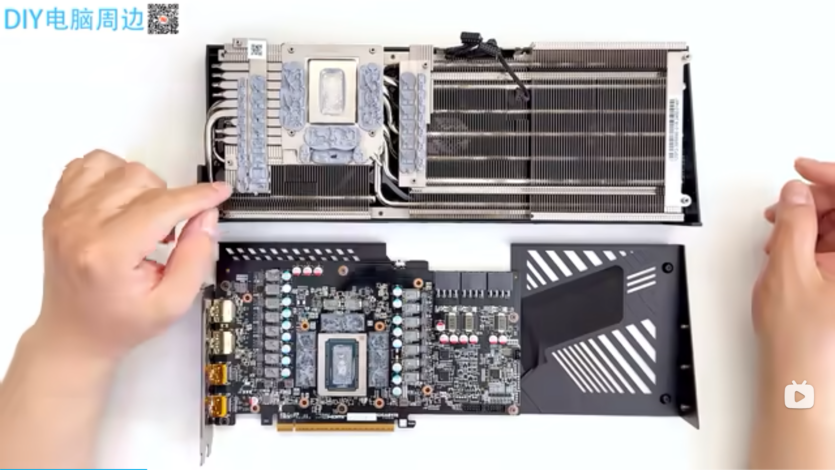
The cooling system is one of the key components of modern graphics cards. High temperatures of video memory often go unnoticed by users, although they can affect the stability and durability of the graphics adapter. Last month it was reported that Gigabyte’s RTX 50 graphics cards have a problem with thermal gel leakageand this is creates a risk of overheating of memory chips. And now a Chinese enthusiast named DIY电脑周边 (DIY Computer Peripherals) from the Bilibili platform has shown how to improve temperature performance on the example of the Gigabyte Aorus Radeon RX 9070 XT Elite 16G model – simply by replacing the thermal gel with conventional thermal pads.
Replacing the thermogel
The owner of the video card asked DIY Computer Peripherals to improve the cooling system. Recently, Gigabyte has been using a special thermal gel — a paste-like material that has good thermal conductivity, rather than classic thermal pads. However, this particular gel has caused a lot of criticism due to leaks, especially when installing video cards vertically.
Gigabyte officially recognized the problem with early batcheswhere too much gel was applied. The company assured us that the volume of the material had been adjusted and leakage should not occur again. Nevertheless, the user decided to replace the factory thermal gel with conventional thermal pads. The video shows the entire process — from removing the radiator to the complete replacement of the material.
During the dismantling process, the gel was removed with isopropyl alcohol and wipes, and the residue was carefully removed with a plastic tool. For replacement, we used Gilson HD800 and HD1200 pads, which have a thermal conductivity of 8 W/m-K — not the highest on the market, but quite decent. They are sold for about $1.53 per sheet.
The main Navi 48 chip has a so-called phase-change pad, and the GDDR6 memory, chokes, and MOSFETs have classic soft thermal pads. It’s important to choose the exact thickness: if it’s too thin or thick, it can impair heat transfer.
У video provides precise data: for memory chips, the pads should be 1.25 mm thick, for chokes — 1.5 mm. But the author warns that other brands may have different softness and clamping requirements, so these dimensions are relevant only for a specific type of Gilson pads.
Before the replacement, the video card fans were running at 42% of their maximum speed, and the temperatures were as follows:
- GPU Core — 56°C
- Hot Spot — 88°C
- VRAM — 85°C
After the replacement, the speed of the fans decreased by up to 40%. Despite this, the temperature indicators also decreased:
- GPU Core — 53°C
- Hot Spot — 87°C
- VRAM — 78°C
The memory benefited the most, with a 7°C decrease indicating that the new pad is more efficient at dissipating heat than the thermogel. And that’s even without leaking thermal gel. As a reminder, Gigabyte itself claimed that server-class thermal gel has «better thermal conductivity and does not shift over time». But a regular thermal pad proved to be more effective in the case of Gigabyte Radeon RX 9070 XT.
Is it worth repeating?
If your video card is not from the first batch, then you should not be afraid of gel leakage. Gigabyte assures that this does not affect the performance or life of the device. However, if you notice a problem — it is better to contact customer support.
However, in DIY Computer Peripherals’ experience, replacing the thermal gel with pads is a feasible and effective operation. It can make your system quieter and cooler — especially if you do a lot of gaming or heavy tasks.
New powerful graphics cards have been the subject of many bad news stories since their release. They include power connectors melted, аprices were comparable to a used car. And now there are problems with the leakage of thermogel in Gigabyte devices, which, moreover, turned out to be not as effective as the manufacturer claimed.
Source: tomshardware

Spelling error report
The following text will be sent to our editors: